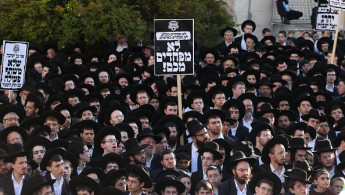Israel parliament revives controversial bill on ultra-Orthodox military conscription
Israel's parliament voted on Tuesday to revive a controversial bill to conscript ultra-Orthodox Jews, which is backed by Prime Minister Benjamin Netanyahu but has been criticised by his defence minister.
Lawmakers voted 63 to 57 to press ahead with the draft law, which foresees a gradual but limited increase in the number of ultra-Orthodox Jews doing military service.
The majority of Israeli Jewish men must serve in the military, but the ultra-Orthodox community has been exempt in favour of religious study.
The reform was criticised by Defence Minister Yoav Gallant as not going far enough.
"We must not play petty politics on the big backs of IDF (army) soldiers," Gallant said following the parliamentary vote.
"Bearing the burden of military service is a national challenge," he added.
The Israeli military is currently engaged in a deadly war in the Gaza Strip, indiscriminately shelling and bombing the enclave daily.
The Israeli military has killed at least 37,124 Palestinians since October 7. Additionally, the Israeli military is engaged in almost daily cross-border fire with the Lebanese group Hezbollah.
Netanyahu has for years courted ultra-Orthodox and far-right religious nationalist allies, who sit in his governing coalition, notably Itamar Ben-Gvir and Bezalel Smotrich.
Opposition leader Yair Lapid accused the premier of pushing forward with a conscription bill without "any value" in order to hold onto power.
The vote amounts to "one of the most despicable moments in the history of the Knesset (parliament)," he wrote on social media platform X, accusing the government of pressing ahead with a "law of evasion".
Following the vote, the bill will be examined by parliamentary committees before returning to the full chamber for further debate.




 Follow the Middle East's top stories in English at The New Arab on Google News
Follow the Middle East's top stories in English at The New Arab on Google News
![A group of Palestinians, foreign and Israeli activists gather to participated in an olive picking event on the land in the town of Battir, which is under threat of confiscation by Israel in Bethlehem, occupied West Bank on 8 November 2024. [Getty]](/sites/default/files/styles/image_330x185/public/2182930803.jpeg?h=199d8c1f&itok=__0LgGsa)

![People gathered around the rubble of destroyed houses to search for survivors [Getty]](/sites/default/files/styles/image_330x185/public/2024-11/GettyImages-2184733820.jpg?h=199d8c1f&itok=NiM1LO2f)